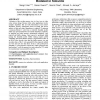Free Online Productivity Tools
i2Speak
i2Symbol
i2OCR
iTex2Img
iWeb2Print
iWeb2Shot
i2Type
iPdf2Split
iPdf2Merge
i2Bopomofo
i2Arabic
i2Style
i2Image
i2PDF
iLatex2Rtf
Sci2ools
130
click to vote
DAC
2006
ACM
2006
ACM
Buffer memory optimization for video codec application modeled in Simulink
Reduction of the on-chip memory size is a key issue in video codec system design. Because video codec applications involve complex algorithms that are both data-intensive and controldependent, memory optimization based on global and precise analysis of data and control dependency is required. We generate a memory-efficient C code from a restricted Simulink model, which can represent both data and control dependency explicitly, by applying two buffer memory optimization techniques: copy removal and buffer sharing. Copy removal is performed while parsing the Simulink model. Buffer sharing requires global scheduling and formal lifetime analysis. Experimental results on an H.264 video decoder show that the buffer memory size and execution time of the C code generated by the proposed method are 71% and 32% less than those of the C code produced by Simulink’s C code generator, respectively. When compared to the hand written C code, the memory size was reduced by 27% while its execution ti...
| Added | 13 Jun 2010 |
| Updated | 13 Jun 2010 |
| Type | Conference |
| Year | 2006 |
| Where | DAC |
| Authors | Sang-Il Han, Xavier Guerin, Soo-Ik Chae, Ahmed Amine Jerraya |
Comments (0)

